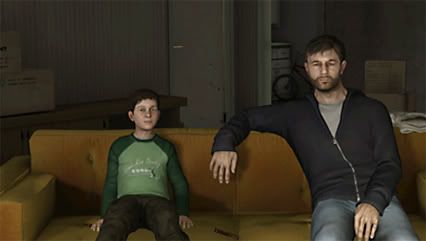 Are videogames still “games,” or is this word and many like it outdated terminology passed down from our hobby’s earliest of days?
Are videogames still “games,” or is this word and many like it outdated terminology passed down from our hobby’s earliest of days?
Certainly, videogames have progressed since their earliest, primordial hours. Gone are the days when one large, rectangular “ball” bounced off of two other larger, rectangular blocks. The medium has advanced to the brink of realism. Where titles such as Heavy Rain show us examples of living life as a modern family, even if for just a brief moment. Graphics, coupled with sounds and storytelling is rife with potential for in-depth exposition, and inarguably the biggest threat to traditional cinema, even without explosions.
Well, not many explosions, at least.
Other mediums haven’t suffered from this genre-breaking revelation the same way videogames have. Television has always been television, radio has always been radio, and books and theatre plays have always grown, or been forced to grow and expand; but there has never been any reason to discuss if they should have affixed to their art a different title.
It took games 30 or more years to get where they are today, but it feels like it’s only been a decade. Perhaps it is the relative freshness of the industry which garners it the prestige of being “expensive kid toys” by the countless millions who have never allowed themselves to explore rich, digital worlds.
Technology is always evolving, and every medium takes advantage of it. However, let us assume that television and film are gaming’s nearest competitor. While television eventually adopted high definition quality (or more recently, a fascination with the third dimension), what television is able to do to connect with its audience has always remained the same. You sit on your couch, and a glowing box forces a story down your face hole.
And until recently, games have been the same way. Just look at all the countless mindless shooters available, and remember all the devastatingly bland corridors we’ve been forced to stomp through in the past 15 years. Until one developer decides to stand up and make a drastic alteration to the status quo, most creators are willing to milk older ideas.
But the basic principal was always there. Choose your own adventure games have existed in even the barest text adventures for decades, but only now has technology finally advanced to the point where we can actually immerse us as that character. No longer do you have to pretend to be your created avatar, because for as long as you can stomach per day, you can actually live as your digital self.
While still limited to budget, production times and willpower, games continue to bridge this barrier and break previous boundaries. Open sandbox games such as Grand Theft Auto 4 and third person shooters like Mass Effect 2 have come remarkably close to letting you actually be either Niko Belic or John Shepard, and because of your interactivity and the way developers have written dialogue trees, you begin to care about your character and live their lives as if they were your own – with care, dignity, awareness and justification.
There is hardly any doubt that games are “art.” Though debatable, they do have art assets, such as music and graphics, and tons of them, at that. Though to be fair, the definition of art, as according to dictionary.com is: “the quality, production, expression, or realm, according to aesthetic principles, of what is beautiful, appealing, or of more than ordinary significance.”

Rhythm games have enjoyed their limelight, but their popularity might set back the industry in the eyes of the extremely critical.
Humorously, it is a totally subjective definition, much like anything of meaning; but the keyword to notice is “expression.” Quite simply, gaming allows one to express him or herself like no other medium possibly ever could. Even if we are not quite at the point where we can interact with hundreds of non-playable characters in a holodeck-like environment, a la Star Trek, there is absolutely no reason to expect we will not experience that undertaking in our lifetimes.
The idea of calling games something different has been passed around for the better part of the last decade, and thus far, the most accepted alternate title is “interactive digital experience.” Agree or disagree, it is unimportant. To be frank, the title is too long, doesn’t roll off the tongue, and might have been suggested far too late. Thank you, pop culture.
The question is this: if games are no longer simple ball-hits-paddle affairs, have they indeed grown beyond their current pop culture slang? Or for that matter, is it even too late to argue the point, given that the word “game” has been deeply ingrained in our minds since many of us were born?
And no, it isn’t important, but did anyone one else notice (weeks ago now) that when Roger Ebert was busy trolling the internet claiming that “games will never be art,” that he never once used the word “expression” in any of his pieces? I’m just sayin’, is all…
LINKS
Video games can never be art ~ Roger Ebert




















Nice article, I really liked the way the words just rolled off the page and into my face hole! Ha ha, man that one’s going right in my vocabulary.
Seriously though, I’m not sure we can ever call them anything else now. Digital Experience, Electro Realm Holiday, Virtua Trip? I know as well as the rest of us (gamers), what the “you’re a grown man that plays kids games?” look looks like and I hate it for the ignorance that it implies to me, but I assume I’ll just have to put up with it forever more.
Can games be art though? MAN! Don’t get me started!!!
Q: Can We Still Call Them “Games?”
A: Yes
The term video or computer game is as apt today as it was 30 years ago. Even Heavy Rain, with it’s low interactivity level, I would still call a game.
Ok lets take this a step further, is HOME a game or is it a social experience, or is it art? Within it you can have art, there are even games and some people are sociable. Surely the truth is the boundaries are merging and those from traditional art forms are uncomfortable with this as their ‘territory’ is under threat from this ever increasing level of convergence (yup I HAD to get that word in).
I’d call HOME a social networking space. I don’t think it counts as a game since there are no traditional game parameters such as objectives, score etc.
so what if they added trophies for interaction, doing stuff etc? is it then a game?
If you were “doing stuff,” by empty’s definition, yes, it would most assuredly be a “game.”
For me art is where a non realistic experience (i.e. not the real thing) makes me feel and think about an issue, situation, or experience an emotion via it’s stimuli.
On that basis more and more ‘games’ are able to achieve this. However very few if ANY are able to sustain it throughout the entire experience.
Based upon the improved story telling, voice acting, art style and music in games though I feel secure in belief that games are slowly able to achieve that emotional stimuli or challenge, rather than JUST being a timing/adrenaline test and rush.
Tetris = game
Fifa = game
Red Dead Revolver = art and game
heavery rain = art and game
Mario Galaxy = art and game. What do I feel when playing this? Happiness! Have you seen the art style (see we even use the phrase ‘art style’!)?
Honestly, as an artist I’ve never felt afraid of calling a game a work of art. But you’re (Steven) right on the button about the definition of which games can be art. May I point your attention to a game called Passage, it’s in the middle of being a game and being art. Because it’s short it gives you just long enough play time to call it a game, yet at the same time it’s length is perfect for reflection of what you just witnessed (about as long as a picture needs to make an impression on you). I belive there’s a good little write up on it somewhere on the net, where was it…
Oh yeah! On Criticalgamer!!!
If you put scores, objectives or “stuff” into HOME then you would get a MMOG. Gotta agree with you steven g on your art/music/emotion arguement. BioShock 1 and 2 are works of art too.
The Ebert/Art discussion is interesting but ultimately futile. We can never fully decide whether or not video games as a whole are art because we are still trying to suss out what “art” is. There are several Turner Prize winners whose “art” is being debated still and it’s impossible to say that an entire medium is art. All movies, all paintings and all albums can’t be art surely? There are as many definitions are there are definers.
Really good and thoughtful article. But I think “game” is here to stay. We still call movies “movies” even though the term “moving pictures” is hilariously archaic by now. Games are still games, even if they have new motives and forms now, but the term still covers the medium.
Rikard and Steven have the right idea, pointing out that some games are art and some are not. Trying to class videogames as a whole as art is foolish, and impossible to justify.
Regardless of artistic value, a good game is one that is fun to play, simple as that. Do Okami and Psychonauts have artistic worth, aesthetically and thematically? Yes. Are they fun to play? Yes. Therefore, good games.
Does Tetris have artistic worth? Unless you’re enthusing about mathematical beauty, no it does not. It is however one of the most famous and addictive videogames ever released.
I think the key here is when something impressive has been created in any form, be it an office block drawn on an architects drawing board, the sculpt of a cars body or just a well made level in LBP! Cutting a cow in half is not art, nither is filling a museum up with various kinds of balls! Although that is only my opinion, and that’s the problem “art” has; no true definition.
The unfortunate truth is that “beauty is in the eye of the beholder” and it’s because of this there will never be a true definition of art. There will always be those who call themselves artists, but it will be their fans or followers who decide if they truly are. After all, a computer can make fractal art (a visual AND mathematical amazement) that no human could acheive, but does that make it an artist?
Damn; I told you not to get me started…